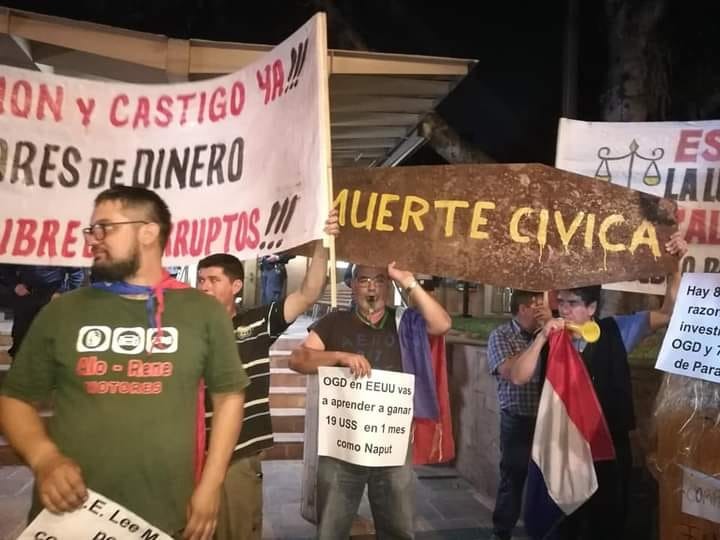
Civil and neighborhood associations play a crucial role in the defense of human rights and the fight against corruption, a problem deeply rooted in the country's sociopolitical structure. From the dictatorship of Alfredo Stroessner to contemporary challenges, these associations have been the main mechanism of resistance and support for the most vulnerable communities.
A context marked by corruption and inequality
Paraguay faces serious corruption problems that affect all spheres of society. Despite efforts to combat it, such as the creation of specialized agencies and the implementation of legislative reforms, corruption remains a systemic problem. This has had a significant impact on the country's economy, discouraging foreign investment and affecting economic growth. According to Transparency International's Corruption Perceptions Index, Paraguay is among the most corrupt countries in the world.
The legacy of General Alfredo Stroessner's regime, which ruled the country from 1954 to 1989, left deep scars on Paraguayan society. During this period, the military dictatorship repressed the opposition, limited civil liberties and committed serious human rights violations, including arbitrary arrests, torture and enforced disappearances. The dictatorship was largely sustained by corruption, with land being distributed to officials and party leaders at ridiculous prices. Despite the end of the regime, the effects of corruption and repression are still felt today, affecting the consolidation of democracy and human rights in Paraguay.
Violation of human rights and new challenges for Paraguayan society
The human rights situation in Paraguay is worrying due to various problems such as violence, discrimination and corruption. In 2020, the Ombudsman's Office received more than 579 complaints of human rights violations, mostly related to police abuse and torture. In addition, gender violence is alarming, with a significant increase in cases of femicides and domestic violence in recent years.
The LGBTI population also faces discrimination and violence, while child labour and labour exploitation are serious problems affecting the quality of life of the population. In this context, neighbourhood and civil organisations have taken on a key role in defending the rights of the most vulnerable, demanding transparency and fighting for social justice.
The role of neighborhood associations
Neighbourhood associations in Paraguay, such as the Federación de Entidades Vecinalistas del Paraguay (FEDEM) and the Comptroller General of Luque (CCL), have become fundamental pillars of the fight for human rights and against corruption. These organisations have been a meeting point for citizens, encouraging active participation and organising demonstrations and protests to denounce corruption and demand justice.
FEDEM, for example, brings together various neighbourhood associations and represents the interests of their communities before the authorities. It promotes community projects and works to inform citizens about their rights and duties. The Citizen Comptroller's Office of Luque, for its part, has been carrying out actions to influence public policies for nearly 20 years, auditing municipal management and reporting irregularities.
Neighborhood activism against corruption
One of the most representative cases of neighborhood activism in Paraguay is the fight against the González Daher clan, a family with great political and economic power, accused of corruption and money laundering for decades. The citizens of Luque, supported by the CCL, have organized demonstrations and protests to demand justice and denounce the illegal activities of this family.
Thanks to citizen pressure, in 2018 Senator Víctor Bogado, one of the González Dahers' main allies, was convicted for illicit enrichment and money laundering. This case shows that citizen mobilization can have a real impact in the fight against corruption and in the creation of a fairer and more transparent system.
Women human rights defenders and their challenges in Paraguay
Women human rights defenders in Paraguay face a hostile context that makes their work difficult. According to the Human Rights Coordinator of Paraguay (Codehupy), more than 200 cases of threats, harassment and attacks against activists were recorded in 2020. These situations are the result of an environment of impunity and lack of protection by the State.
The Paraguayan government has not taken sufficient measures to protect human rights defenders, especially those working on issues such as land, the environment and justice. Despite the risks, activists such as Hugo Gualberto Vázquez Perini, from the Citizens' Comptroller's Office of Luque, and Miguel Ángel Sanabria Irepa, from FEDEM, continue to work tirelessly to promote human rights and combat corruption.
The Foundation for Justice project: A link between Paraguay and Valencia
In this context of violation of human rights and fight against corruption, the Foundation for Justice of the Valencian Community has launched the project «Visibility and defense of human rights activists through neighborhood activism in Paraguay»This initiative aims to raise awareness among Valencian citizens about the reality in Paraguay and to promote cooperation alliances between organizations from both territories.
The project includes awareness-raising activities in both Valencia and Paraguay, such as workshops, round tables and the screening of documentaries that will give voice to Paraguayan activists. It also seeks to strengthen the capacities of Paraguayan neighbourhood associations by creating synergies with Valencian entities, promoting the exchange of knowledge and experiences to improve the quality of life of the most vulnerable communities.
